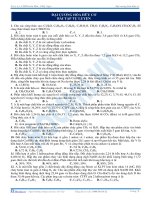PASSIVE CO BAI TAP LUAN
Bạn đang xem bản rút gọn của tài liệu. Xem và tải ngay bản đầy đủ của tài liệu tại đây (33.56 KB, 3 trang )
<span class='text_page_counter'>(1)</span><div class='page_container' data-page=1>
<b>ACTIVE – PASSIVE VOICE</b>
<b>I. General formation:( Công thức tổng quát )</b>
<b>II. Cách đổi từ thể chủ độâng sang thể thụ động:</b>
-Bước 1: biến túc từ của câu chủ động thành chủ từ của câu thụ động.
-Bước 2: động từ “ TO BE” được chia cùng thì với động từ chính của câu chủ động và
phải hoà hợp với chủ ngữ mới.
-Bước 3: đổi động từ chính của câu chủ động sang quá khứ phân từ ( Ved/3 ).
-Bước 4: thêm “ by” vào.
-Bước 5: biến chủ từ của câu chủ động thành túc từ của câu thụ động.
EX: - She wrote that letter.
-> That letter was written by her.
* Chú ý: - Trạng từ chỉ nơi chốn thường đứng trước “ by”.
- Trạng từ chỉ thời gian thường đứng sau “ by” .
- Những túc từ sau thường được bỏ đi: by people, by them, by someone,by anyone,
by no-one, by everyone, by everybody, . . .
EX: 1. Jane bought a new coat last Sunday. 2. You can’t make tea with cold water.
-> A new coat was bought by Jane last Sunday. -> Tea can’t be made with cold water
<b>III.</b> <b>Cơng thức thể bị động của các thì:</b>
<b>Tên thì</b> <b>Active voice -> Passive voice</b>
1. Simple present
Hiện tại đơn S + Vo/ Vs / Ves + O
S + Am/ Is/ Are + Ved/ 3 + By O
2. Simple past
Quá khứ đơn
S + Ved/2 + O
S + Was/ Were + Ved/ 3 + By O
3. Modals
( will/ shall/ can/ may/
must/ would/ should/
could/ might …)
S + Modal + Vo + O
S + Modal + Be + Ved/ 3 + By O
4. Present continuous
Hiện tại tiếp dieãn S + Am/ Is/ Are + V-ing + O
S + Am/ Is/ Are + Being + Ved/ 3 + By O
5. Past continuous
Quá khứ tiếp diễn
S + Was/ Were + V-ing + O
S + Was/ Were + Being + Ved/ 3 + By O
6.Present perfect
Hiện tại hoàn thành
S + Has/ Have + Ved/ 3 + O
S + Has/ Have + Been + Ved/ 3 + By O
<b>Active: S + V + O</b>
</div>
<span class='text_page_counter'>(2)</span><div class='page_container' data-page=2>
*Dạng đặc biệt:
* Trường hợp 1 : Khi động từ : say/ know/ think/ believe cùng thì với V
Trường hợp 2 : - Khi động từ : say/ know/ think/ believe ở thì hiện tại nhưng V chia ở thì
quá khứ hoặc thì hiện tại hoàn thành .
- Khi động từ said/ knew/ thought/ believed ở thì quá khứ nhưng V chia ở thì
quá khứ hoàn thành.
Ex1: People say that he beats his wife.
It is said that he beats his wife.
He is said that to beat his wife.
Ex2: They thought that he had died in battle.
It was thought that he had died in battle.
He was thought to have died in battle.
<b>EXERCISE : Turn into Passive voice:</b>
1. They have used that refrigertor for fifteen years.
________________________________________________________
2. People believed that the earth was flat.
________________________________________________________
3. The children will find many books on the shelf.
________________________________________________________
4. They say that he plays football very well.
________________________________________________________
5. The chief engineer is instructing all the workers of the plant.
________________________________________________________
6. Someone has taken some of my books away.
________________________________________________________
7. The boys broke the window and took away some pictures.
________________________________________________________
8. They were cutting grass when the car stopped near the gate.
________________________________________________________
9. The children looked at the women with a red hat.
________________________________________________________
10. People spend a lot of money on advertising everyday.
________________________________________________________
11. They have provided the victims with food and clothing.
________________________________________________________
12. People speak English in almost every corner of the world.
________________________________________________________
13. They think that the owner of the house is abroad.
________________________________________________________
Active: People + say/ know/ think/ believe + that + S + V + O
They
Passive: - It + (be) + said/ known/ thought/ believed + that + S + V + O
</div>
<span class='text_page_counter'>(3)</span><div class='page_container' data-page=3>
14. You must clean the wall before you pain it.
________________________________________________________
15. Nobody have ever treated me with such kindness.
________________________________________________________
16. Someone says that tortoises live longer than elephants.
________________________________________________________
17. A storm has destroyed many houses in the village.
________________________________________________________
18. People don’t learn languages over night.
________________________________________________________
19. We are arranging these books into sections.
________________________________________________________
20. One uses milk for making butter and cheese.
________________________________________________________
21. My sister bought this book yesterday.
________________________________________________________
22. Does Nam visit the school library everyday ?
________________________________________________________
23. No-one can meet the President at this time.
________________________________________________________
24. The builders were building a new bridge over the river.
________________________________________________________
25. The lion-tamer attracted my children very much.
________________________________________________________
26. My mother planted that tree long time ago.
________________________________________________________
27. The government hasn’t changed that regulation yet.
________________________________________________________
28. Lan and Mai can speak English fluently.
________________________________________________________
29. They said that he had escaped to a neutral country.
________________________________________________________
30. When did A.G. Bell invent telephone ?
</div>
<!--links-->









